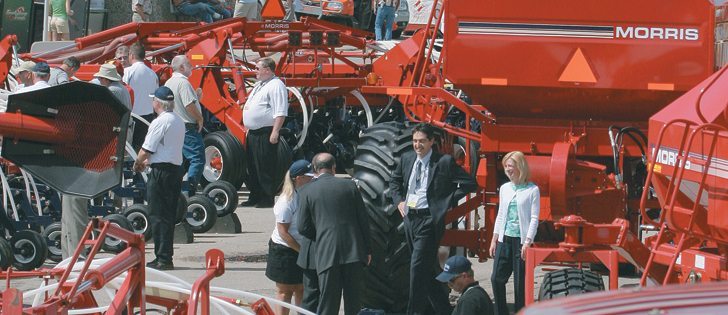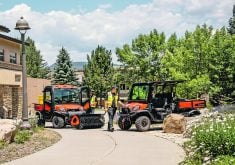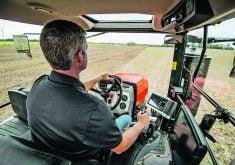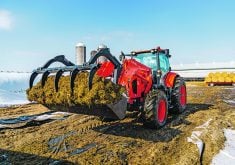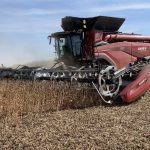You can’t just do business when times are good, says Regina-based dealership owner
Drought and slower farm machinery sales haven’t dampened many equipment dealers’ desire for growth.
Several new and expanded dealerships have been showing up across Western Canada over the past year.
“This is agriculture. You can’t just move in and out of it as a company when times are good and then trend lower,” said Jim Wood of Rocky Mountain Equipment in Calgary.
The company has remained on the expansion track, opening a new dealership facility in Yorkton, Sask., last week.
As well, it has bought Chabot Implements, a Case IH farm equipment dealership chain in Manitoba, and global information systems company NGF in Ontario and reached an equipment distribution agreement with farm technology startup Clean Seed Capital.
Read Also

Pakistan reopens its doors to Canadian canola
Pakistan reopens its doors to Canadian canola after a three-year hiatus.
Rocky Mountain is a large farm machinery chain by Canadian standards with more than 40 farm equipment dealerships handling several brands, including Case IH, New Holland, and Kubota, and a variety of farm services. It has revenues of about $1 billion a year. The company is also involved in construction equipment, auto parts sales and geomatics.
Oil and gas and mining slowdowns are also on the company’s plate, but Wood said it is in the equipment business for the long haul and sees all of the commodity sectors recovering over time.
The company is doing well, he added
“We had to adjust to the market, just like everyone in agriculture does.”
The American Equipment Manufacturers Association says new four-wheel drive tractor sales are off 26 percent in Canada compared to last year at this time. Sales of combines are down 15 percent.
Wood said the company is not facing anything that the industry hasn’t seen before.
“Twenty-seven years I have been in this business, and there has always been too many trades on the lots, commodity prices have never been high enough and we’ve seen drought and flood come and go,” he said.
Doug Tibben of Canada West Harvest Centre in Regina said his company’s expansion with Claas in Western Canada hasn’t been based solely on “a few good years of commodity prices.”
“We have a five year plan, but it’s really within a 10 year plan,” said Tibben.
The company opened two seasons ago. It expanded in Regina this month and will open a new dealership in August in Saskatoon.
“Farmers are still buying, but not at the rate they were,” he said.
“That was a very special time in the history of agriculture. For those of us who have been in the business for our whole careers, and plan to be for many more years, you have to plan for growth.”
Opening a new dealership and expanding the Claas brand beyond the Lexion combine line means taking market share from others, but that is “what you have to do,” he said about the company’s move into selling the Xerion tractor and forage equipment lines.
“You can’t just do business when times are good for farm margins. Just like farmers, we have to be there the whole time.”
Wood said the company has been able to expand its service and farmer support business, which is important to dealership profitability.
Tim Young of Young’s Farm Equipment in Regina, which has nine Case IH dealerships, said the company started out in the late 1980s in its current form and has grown despite tough times in prairies agriculture.
“This June was a great month for us,” said Young.
Last year, the company acquired a dealership at Chamberlin, Sask.
The weak Canadian dollar is putting downward pressure on new machinery sales, but Young said after “five or six unprecedented years, I think farms are pretty healthy. You can’t win the gamble every year, but you can do well if you plan for the long haul.”
Young, who began his farm equipment career in 1973, said the dealership business has been consolidating non-stop.
“Farmers have to invest to stay in business. Larger farms can’t sit still on their infrastructure, so neither can farm machinery dealers. Larger dealers have some advantages of scale, but you have to stay on top of it.”
“Interest rates are very low and that is important for investment decisions for everybody,” he said.
Young said the dealerships that can provide service the most effectively as producers stop buying as much new equipment will be the ones that remain sustainable.
“Farmers will do business wherever they can get parts and service so they can keep rolling, so that means companies like ours will succeed if we invest in those things,” he said.
“We are also seeing some growth in the trades. Young people are getting into agricultural (mechanical repair). That’s good for companies like ours. We can grow that part of business because we can get the staff.”
Young had previously recruited those workers from Ireland, but “we haven’t been back there in 14 or 15 months because there is finally a crop of them available here,” he said.
“Skilled staff are critical to (farm equipment) dealerships and their success.”
Wood agreed, saying the company has been able to keep its bottom line healthy despite a drop in the company’s gross sales for 2014, partly because of a 21 percent improvement year over year in its product support revenue.
The company reported $31 million in revenue for that division last year despite a 4.2 percent decline in gross sales.

